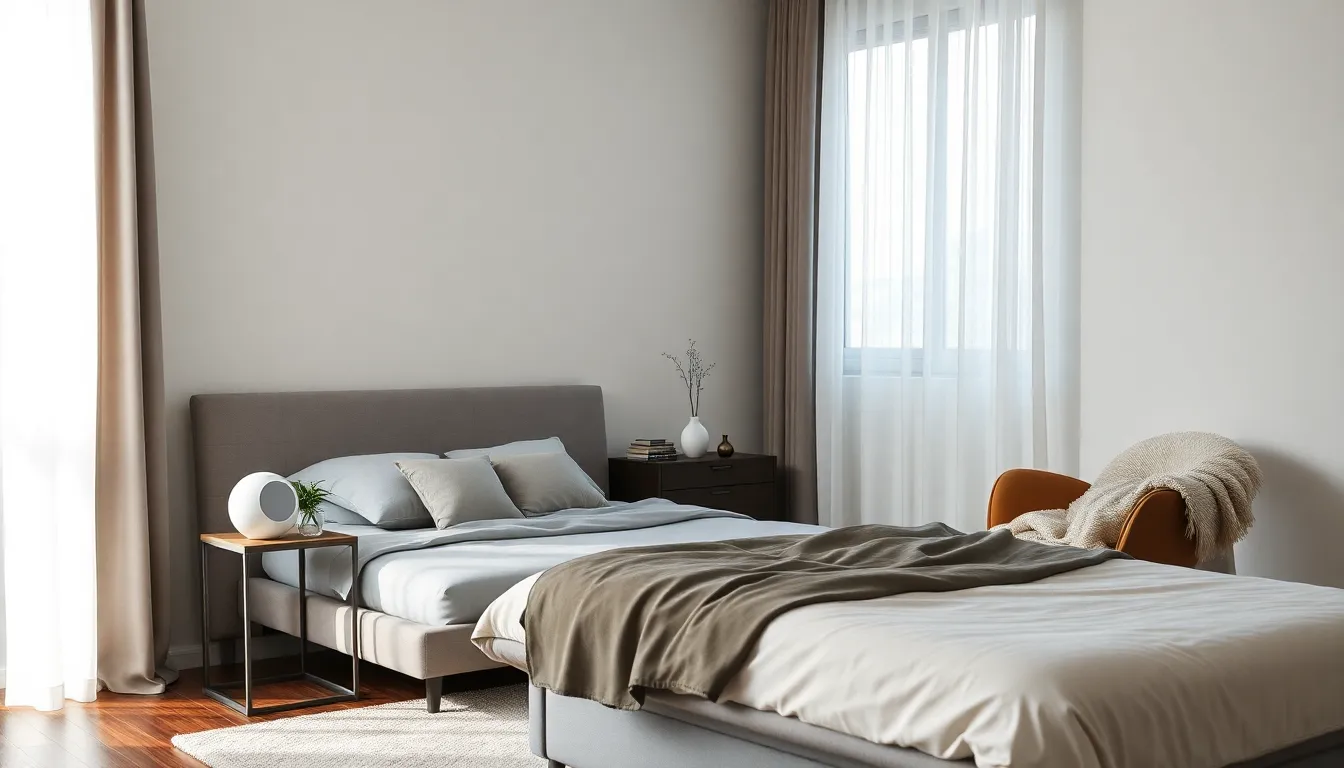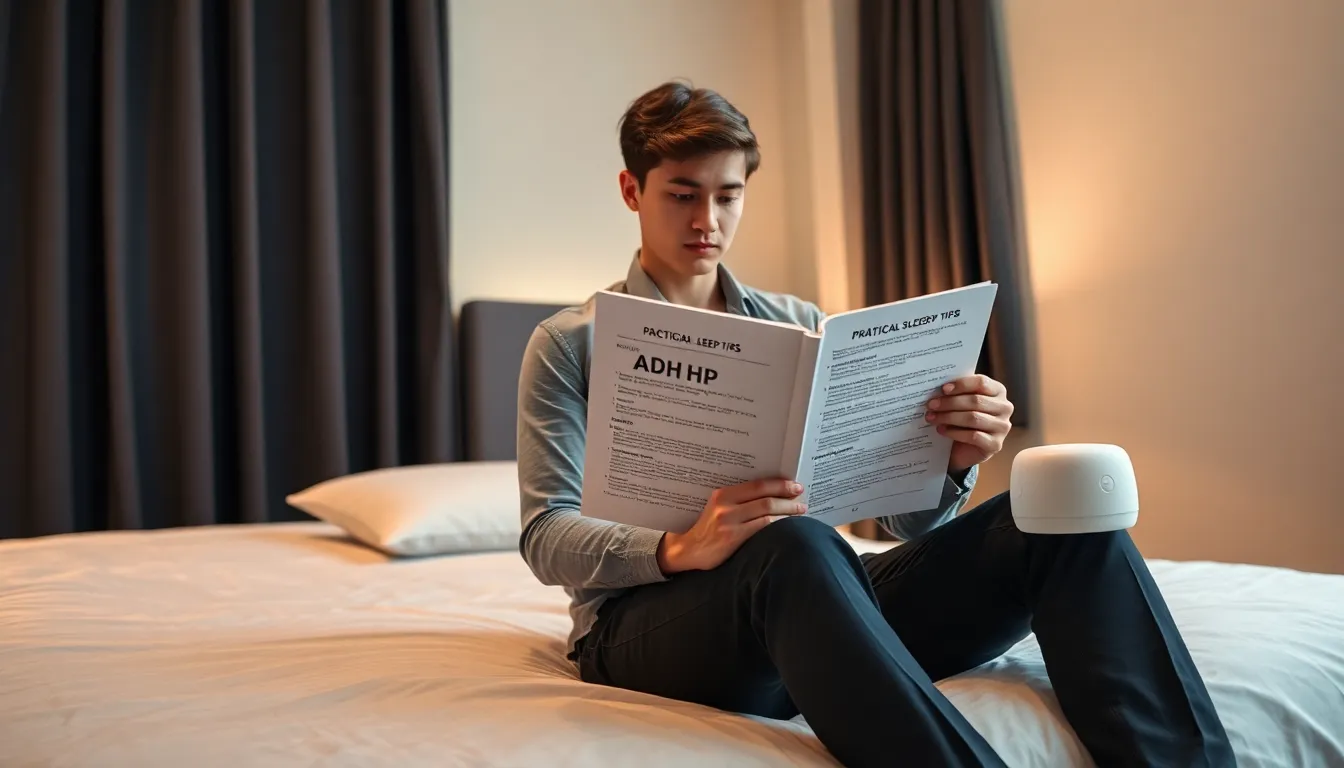Sleep might seem like a mundane part of life, but for individuals with ADHD, it often presents a puzzling conundrum. If sleepless nights were an Olympic sport, they’d definitely be on the podium. Luckily, there are effective strategies to tackle this issue head-on. This article explores ADHD sleep tips that will help anyone improve their nightly rest while sprinkling in a bit of humor along the way. So, let’s jump into the delicate dance between ADHD and sleep for a more harmonious night.
Table of Contents
ToggleUnderstanding ADHD and Sleep Challenges

Attention Deficit Hyperactivity Disorder (ADHD) is a condition often accompanied by an array of challenges, particularly when it comes to sleep. Many individuals with ADHD experience difficulties falling asleep or staying asleep. This can significantly disrupt their daily lives and contribute to increased fatigue and irritability.
Several factors contribute to these sleep issues. Restlessness, racing thoughts, and a heightened sensitivity to stimuli can create a perfect storm for insomnia. It’s not just about counting sheep, it’s about conquering the mental hurdles that make sleep elusive. Understanding this connection between ADHD and sleep is crucial in finding effective solutions.
The Importance of Sleep for Individuals with ADHD
Sleep is not just a luxury: it’s a necessity. For individuals with ADHD, good sleep can improve attention span, emotional regulation, and overall well-being. Studies have shown that lack of sleep can exacerbate ADHD symptoms, making it even more challenging to stay focused during the day.
In essence, sleep acts as a reset button for the brain. It enhances cognitive function, boosts executive functions, and refines emotional responses. By prioritizing sleep, individuals with ADHD can harness their full potential, leading to a more productive and fulfilling life. So, why not view sleep as an ally rather than a foe? It’s a game-changer.
Practical Sleep Tips for Better Rest
Sleep doesn’t just happen: it’s crafted. Here are practical strategies that can make a significant difference in achieving restful sleep.
Creating a Sleep-Conducive Environment
First impressions matter, and the bedroom should set the tone for relaxation. Aim for a cool, dark, and quiet space. Blackout curtains can block out any pesky street lights, while a white noise machine can drown out distractions of the outside world. Don’t forget to tidy up: a clutter-free space often translates to a clutter-free mind.
Establishing a Consistent Sleep Routine
Consistency is key. Going to bed and waking up at the same time every day helps regulate the body’s internal clock. This rhythm can enhance sleep quality, making it easier to drift off at night. Encourage the body to recognize cues, dim the lights an hour before bedtime and perhaps even indulge in a calming pre-sleep activity, like reading a book or sipping chamomile tea.
Managing Screen Time Before Bed
Screens are the modern-day sirens, luring us in with glowing stories only to rob us of peaceful sleep. Encourage a digital detox at least an hour before bed. The blue light emitted by devices can disrupt melatonin production, the hormone responsible for guiding sleep. Swap that scrolling time for a nightly ritual that promotes relaxation.
Incorporating Relaxation Techniques
Engaging in relaxation techniques can significantly improve sleep quality. Techniques like deep breathing, progressive muscle relaxation, or mindfulness meditation can help ease anxiety and tension. These practices encourage the mind to wind down, paving the way for restorative sleep. Combined, they serve as a powerful antidote to the racing thoughts that often accompany ADHD.
The Role of Nutrition and Exercise in Sleep
Nutrition and exercise also play pivotal roles in the sleep equation. A balanced diet can influence sleep patterns and stress levels. Foods rich in magnesium and tryptophan, such as nuts, seeds, and turkey, can promote better sleep. On the other hand, consuming large meals, caffeine, or sugary snacks close to bedtime can hinder sleep quality.
Exercise, similarly, can be a total game-changer. Regular physical activity enhances not only physical health but also emotional well-being. Daily exercise can help regulate sleep patterns and reduce anxiety. But, timing is crucial: indulging in vigorous workouts close to bedtime can have the opposite effect, leaving one too energized to sleep.
When to Seek Professional Help
Sometimes, even though best efforts, sleep issues persist. It may be time to consult a healthcare professional if sleepless nights take a toll on overall well-being. Professionals can help identify underlying problems, offer tailored treatment options, or provide referrals for specialists trained in sleep disorders and ADHD. Seeking help is not a sign of weakness: it’s a proactive step towards reclaiming peaceful nights.



